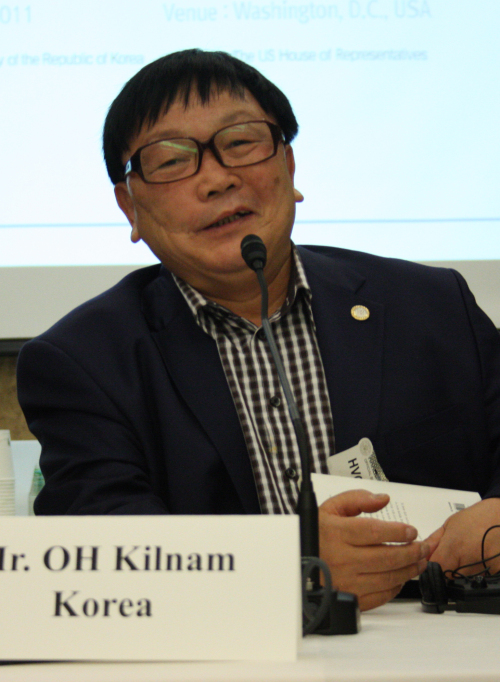Oh asks for global help to save his family in North Korea
By Korea HeraldPublished : Nov. 15, 2011 - 19:42
WASHINGTON (Yonhap News) ― A teary old Korean man appealed Monday to legislators from around the world for help in his desperate efforts to meet his wife and two daughters who he hopes are alive in North Korea.
“I believe they are alive. Otherwise, I don’t have a reason to live,” Oh Kil-nam, a 69-year-old retired economist, said at an international forum held on Capitol Hill.
He was testifying at the eighth general meeting of the International Parliamentarians’ Coalition for North Korean Refugees and Human Rights (IPCNKR), attended by lawmakers from South Korea, the United States, Japan, Canada, Poland, Mongolia and Cameroon.
Oh defected to North Korea in 1985, while studying in West Germany, after receiving an offer to teach in the communist nation along with a promise to get “everything” he needed, including free health care. His wife, Shin sook-ja, was sick with hepatitis. Oh was also critical of South Korea’s then-authoritarian regime.
“I was indeed a fool at that time,” Oh said. “The decision to go to North Korea was completely absurd.”
“I believe they are alive. Otherwise, I don’t have a reason to live,” Oh Kil-nam, a 69-year-old retired economist, said at an international forum held on Capitol Hill.
He was testifying at the eighth general meeting of the International Parliamentarians’ Coalition for North Korean Refugees and Human Rights (IPCNKR), attended by lawmakers from South Korea, the United States, Japan, Canada, Poland, Mongolia and Cameroon.
Oh defected to North Korea in 1985, while studying in West Germany, after receiving an offer to teach in the communist nation along with a promise to get “everything” he needed, including free health care. His wife, Shin sook-ja, was sick with hepatitis. Oh was also critical of South Korea’s then-authoritarian regime.
“I was indeed a fool at that time,” Oh said. “The decision to go to North Korea was completely absurd.”

He said he had realized that his choice was wrong upon arriving at a Pyongyang airport. Oh and his family were sent to a North Korean mountain area for brain-washing and then he was assigned to work at a propaganda radio station.
He was sent back to Germany in 1986 on a mission to entice more South Koreans to the North, leaving behind his wife and two daughters ― Hye-won and Gyu-won. He took political asylum in Denmark.
Based on North Korean defectors’ remarks, a South Korean newspaper recently reported that Oh’s family stayed at the Yoduk gulag at least until 2005.
“I still hope for the day I hug them and cry together,” Oh said, with his eyes teary. “I appeal to those who preserve human rights around the world to help them escape the North.”
Oh’s story served as a reminder of North Korea’s human rights abuses and the cruelty of its political concentration camps.
More than 100,000 South Korean people have joined the signature-collecting campaign to formally request that the United Nations do something to rescue Oh’s family. Some conservative South Korean lawmakers and human rights groups also kicked off a campaign in the United States.
“We plan to submit a petition to the U.N. on Nov. 18,” Rep.
Park Sun-young of South Korea’s Liberty Forward Party said at the IPCNKR session. “I think the collection of small efforts will create a miracle.”
Rep. Ed Royce (R-CA), co-chairman of the IPCNKR, stressed the need to enhance public awareness of North Korea’s human rights abuses.
“There is much less interest in the plights of North Koreans compared to other human rights abuses around the world,” he said.
Royce, who has long endeavored to help address the North’s human rights record, said a change should come from within the society, adding radio programs and DVDs from the outside world can accelerate it.
“Radio will continue to be an important tool for change there, but as technology changes, so do the ways which people acquire information. North Koreans are turning to DVD players that have become a very common item in North Korean households,” he said.
According to a survey of North Korean defectors, he pointed out, 25 percent of them watched South Korean DVDs when they were in the North.
Royce also reaffirmed his strong objection to further food aid for the North, which is preparing for a big celebration next year to mark the centennial of the late founder Kim Il-sung.
He praised the international parliamentarian group on the North’s human rights and refugee program, founded in 2003, saying it “has offered a forum for legislators from around the world to exchange ideas and share legislative initiatives in regard to North Korean human rights.”
-
Articles by Korea Herald










![[From the Scene] Monks, Buddhists hail return of remains of Buddhas](http://res.heraldm.com/phpwas/restmb_idxmake.php?idx=644&simg=/content/image/2024/04/19/20240419050617_0.jpg&u=20240419175937)




![[From the Scene] Monks, Buddhists hail return of remains of Buddhas](http://res.heraldm.com/phpwas/restmb_idxmake.php?idx=652&simg=/content/image/2024/04/19/20240419050617_0.jpg&u=20240419175937)

![[KH Explains] Hyundai's full hybrid edge to pay off amid slow transition to pure EVs](http://res.heraldm.com/phpwas/restmb_idxmake.php?idx=652&simg=/content/image/2024/04/18/20240418050645_0.jpg&u=20240419100350)

![[Today’s K-pop] Illit drops debut single remix](http://res.heraldm.com/phpwas/restmb_idxmake.php?idx=642&simg=/content/image/2024/04/19/20240419050612_0.jpg&u=)